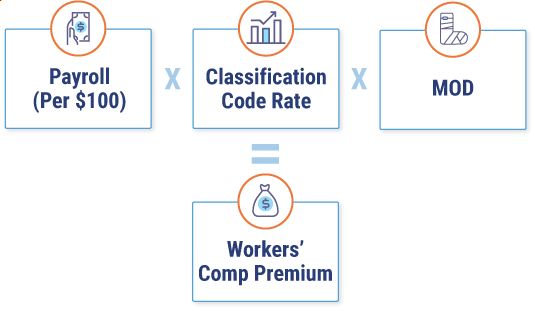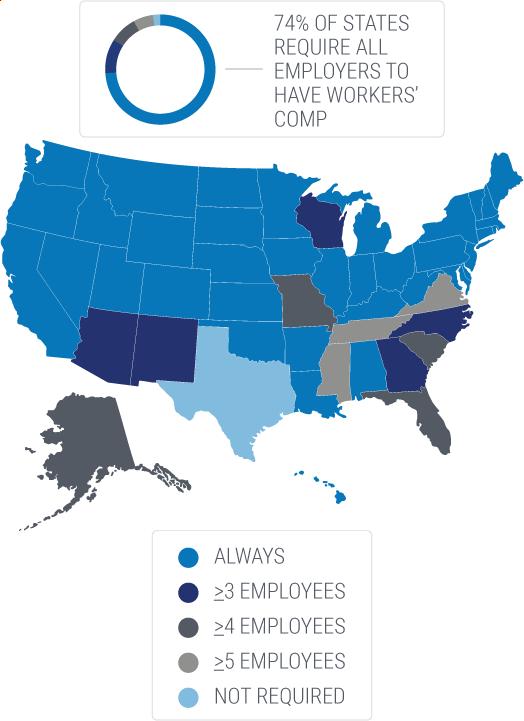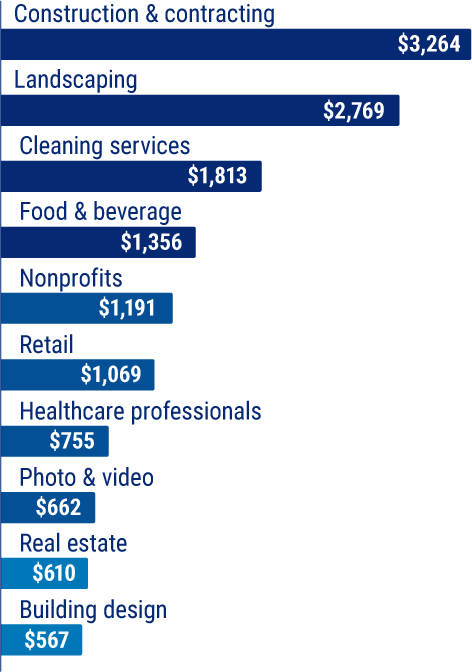How Much Is Workers’ Compensation Insurance in 2025?
The average workers' compensation cost is about $45 per month.

Paul Martin is the Director of Education and Development for Myron Steves, one of the largest, most respected insurance wholesalers in the southern U.S.

Workers' compensation insurance is a type of coverage that can reimburse employees for expenses related to treatments for job-related injuries and illnesses as well as a portion of their wages if they have to miss work due to these incidents.
Workers' comp can cover things like doctors' visits and surgery but doesn't cover incidents of employee injuries due to negligence. The cost of your workers' comp varies based on several factors, but it's still possible to offer averages. Small businesses pay about $45 monthly, or $540 annually, for workers' comp.
This cost estimate is the middle of the pack for small businesses, including size and risk level. Larger businesses or those with riskier occupations, such as the construction industry, will have much higher figures. An independent insurance agent can help you find your location and industry quotes.
Average Monthly Costs of Workers' Compensation Insurance
The median and average cost of workers' comp insurance per month and year depends on your business's industry and many other factors. Here's a quick breakdown of some average and median annual and monthly costs for workers' comp insurance for several types of industries.
Average Workers' Compensation Insurance Cost by Industry
| Industry type | Median monthly workers' comp costs | Average annual workers' comp costs |
|---|---|---|
| Construction | $341 | $4,101 |
| Hotels/motels | $132 | $1,586 |
| Real estate | $21 | $255 |
| Transportation and warehousing | $275 | $3,300 |
| Wholesale trade | $150 | $1,800 |
Note: These average workers' comp insurance costs are based on businesses in Colorado that have only filed 0-1 claims previously, using our workers' comp calculator.
How Workers' Comp Costs Are Calculated
How an insurance company calculates your workers' compensation premium can be a bit complex. But if you know how your premiums are determined, you can figure out how to lower your rates.
The Formula for Calculating Workers' Comp Premiums
There's a lot of math involved when it comes to calculating the cost of workers' comp. Fortunately, you're unlikely to have to crunch these numbers yourself if you enlist the help of an independent insurance agent. However, it's still helpful to have an idea of what the formula is.
Here's an example of the workers' comp cost formula:
Multiply payroll by class rate, then divide by 100. Assuming a worker's salary is $100,000, the formula would look like this: $100,000 x $0.43 = $43,000; $43,000 / 100 = $430.
Multiply the result by your experience rating modifier if you have one. If you had an experience mod of 0.8, the formula would look like this: $430 x 0.8 = $344 total annual premium for clerical workers with the class code of 8810.
Follow this same formula for all employees and add their totals together to figure out your overall annual workers' comp premium.
Don't let these numbers intimidate you. Your independent insurance agent can help ensure you'll never pay too much for workers' comp coverage.
The Formula for Estimating Workers' Comp Premiums

What Factors Affect Your Workers’ Comp Insurance Cost?
Many different factors are used to calculate the cost of your workers' comp premiums, including your state's laws, the industry your business is in, your business's annual payroll, your claims history, and the type of work your employees perform. The higher the risk of your industry and your employees' job duties, the higher the cost of your workers' comp is likely to be.
Some factors that affect workers' compensation insurance costs are:
- State laws
- Industry
- Total annual payroll
- Type of work
- Prior claims
State Laws
Workers' comp is mandatory in all states except for Texas. However, the state requirements vary by how many employees you have and the type of business you run.
In certain states, for example, agricultural workers are not required to be covered by workers' comp. But 74% of states require all employers to carry workers' comp.

Industry
The industry of your business is a major factor in your workers' compensation costs. Certain industries, like construction and restaurants, are considered far riskier to insure than others because of the nature of the employees' job duties.
Employees in the restaurant industry often get injured by slips and falls, cuts, or burns. Employees in the construction industry can suffer from high falls, being crushed by heavy objects, and other devastating incidents. As a result, these are a couple of the industries with higher costs of workers' comp.
Most Common Costs of Workers' Compensation by Industry:
- Hotels: Depending on your state, the average cost per employee per hour is $2.32. Multiply that by 40 hours a week for 52 weeks and you get $4,825.60 annual cost per employee.
- Restaurants: Depending on your state, the average cost per employee per hour is $1.74. Multiply that by 40 hours a week for 52 weeks and you get $3,619.20 annual cost per employee.
- Contractor-Project Managers: Depending on your state, the average cost per employee per hour is $1.62. Multiply that by 40 hours a week for 52 weeks and you get $3,369.60 annual cost per employee.
Median workers' compensation premium by industry

Total Annual Payroll & Number of Employees
The number of your employees and your overall annual payroll are also factors that impact your workers' comp costs. The more employees you have and the higher their payroll, the higher the cost of your workers' comp coverage will be.
Using the workers' comp calculator formula, for clerical businesses with employee salaries of only $50,000, you would multiply the total of $215 (using the formula provided above) by your experience mod of 0.8 to get your total of $172.
Remember that an employee with a $100,000 annual salary had a result of a $344 total annual premium. To calculate your business's total costs for coverage, you would repeat this process for every employee and add all the totals together to get your premium.
Type of Work Done by Employees
The work your employees perform correlates to the job classification codes used in your workers' comp rate formula. Codes for more dangerous industries will correlate to higher workers' comp rates than those for less risky industries.
Just a few examples of NCCI job classification types and codes are:
- 0005 Farm
- 1320 Oil or Gas—Lease Operator—All Operations & Drivers
- 2114 Clam Digging
- 2501 Cloth, Canvas and Related Products Mfg. Noc
- 2589 Dry Cleaning and Laundry Store—Retail & Route Supervisors, Drivers
Check your state's regulations about how these class codes and others impact the rate of workers' comp in your area.
Prior Insurance Claims
Like any other kind of insurance, your claims history also impacts your workers' comp rates. Prior claims can cause your insurance premiums to skyrocket, especially depending on the frequency and severity of claims filed.
Businesses with low to no prior claims history will pay less for their workers' comp than those with many claims on record. If your business has filed multiple claims for employee injury or illness due to unsafe working premises, this could cause your rates to increase quite a bit.
What Is Not Covered by Workers' Comp Insurance?
By now, you should have a pretty good understanding of how to calculate workers' compensation insurance. But you also need to understand what's not covered by workers' comp insurance. A good place to start is with a workers' compensation policy as a whole.
- Full wages: This is lost income, and workers' comp will typically cover 2/3 of the worker's wages. But the percentage varies by state.
- Non-work-related injury or illness: Trying to get workers' comp. to pay for non-work related injuries or illnesses would be considered insurance fraud.
- Coverage beyond what's offered on the policy: Once your policy limits are exhausted for any one claim, that's it.
An independent insurance agent can further explain what a workers' comp policy won't cover for your business.
How to Choose the Best Workers’ Compensation Insurance
When shopping for workers' compensation insurance, there are certain considerations that can help you evaluate your options. Having a bit of background knowledge before you start comparing policies can help you end up with the best possible policy for your business.
Here are a few key points of consideration when evaluating your workers' comp options:
- Understand state laws: Since every state in the country has its own unique workers' comp laws, rules, and regulations, you'll need to be familiar with how much coverage is mandated where your business is located. Purchasing at least the required amount of workers' comp can help your business avoid fines and other penalties.
- Determine your coverage needs: Before you start shopping for coverage, determine the right amount of coverage for your business based on the number of employees you have, your business's industry, and the specific job tasks carried out by your workers. If your business has riskier operations, you'll need a higher coverage limit.
- Understand the policy: It's critical to understand exactly what's covered by workers' comp before you buy it. Look at each policy's list of specific illnesses and injuries that are covered and which are excluded, and check coverage limits and benefit details for when claims are filed.
- Compare quotes: Since not all workers' comp policies are priced the same, you may want to shop around for quotes from a few different insurance companies. This can help you find your area's lowest premium rate and the best discounts.
- Work with an independent insurance agent: An independent insurance agent can actually shop and compare workers' comp policies and quotes for you from several different carriers. They can also find and apply any discounts your business qualifies for.
How to Save Money on Workers’ Comp Insurance
There are a few ways to reduce your workers' comp insurance cost. Since workers' comp is necessary to compensate employees for incidents of injury or illness due to the job or work environment, taking measures to improve the safety of your business can help reduce your coverage rates.
Improving your company's workplace safety initiatives is a great way to score discounts on workers' comp. Consider taking the following actions to help lower your business's premiums:
- Implement employee safety training: Providing proof to an insurance company that your employees have undergone mandatory safety training can potentially help reduce your workers' comp rates.
- Require appropriate safety gear: If your business requires its employees to wear appropriate safety gear when performing certain job operations, this can be another way to lower its workers' comp premiums.
- Identify potential hazards: Preventing injuries and illnesses on the job starts with identifying possible hazards on the work site. Take time to find possible hazards at your business and take action to mitigate workplace incidents and the risk of employees having to file claims.
- Implement appropriate and regular cleaning: Keeping the workplace clean can seriously help reduce incidents. Make sure to implement a cleaning routine at your business to help mitigate risks and reduce the likelihood of incidents and workers' comp claims alike.
- Set and uphold safety standards: After your employees undergo their safety training, inform them of the business's safety standards. Enforce these standards and have consequences in place if employees don't follow them.
- Identify the right limits and deductibles: Make sure your business gets the appropriate amount of workers' comp coverage. Getting too much coverage can mean paying too much for premiums, while not getting enough coverage can lead to state fines and other costly penalties for your business.
There are still additional ways to save on your business's workers' comp policy, such as through bundling discounts. Most carriers allow customers to earn discounts when they bundle more than one type of coverage through them. So, if you have a policy through one insurer already and then add workers' comp, you might qualify for a discount on both of these policies.
Understanding the Cost of Workers' Compensation Insurance
Workers' comp insurance is critical for most businesses with employees to protect against incidents of employee injury or illness caused by the job or work environment. Having workers' comp can also exempt your business from employee lawsuits for related incidents.
While calculating the costs of your premiums can be complicated, working with an independent insurance agent can make things much simpler by providing many different quotes for you together in one place. Working with an independent insurance agent is also the best way to have your coverage details outlined and explained in plain English, so you know exactly what you're getting.
FAQs about Workers’ Compensation Insurance Costs
Workers' compensation insurance covers expenses such as medical bills, missed wages, and rehabilitation costs for employees who get injured or ill due to the work environment or their job duties. A death benefit can also be paid out by workers' comp if an employee dies because of their job.
Workers' comp coverage can be bought from private insurers in most states in the U.S. You can also work directly with an independent insurance agent who can shop and compare workers' comp policies and quotes from several different carriers for you, or you can shop for a policy online.
In most states, you're required to get workers' comp insurance if you have a certain number of employees at your business. The specific requirements vary by business industry and the number of employees, so you'll need to check your state's coverage laws to find out for sure.
If you have a qualified independent insurance agent, you shouldn't have any out-of-pocket costs on your workers’ comp policy, besides maybe a deductible. A vetted and experienced agent will ensure they have considered the full scope of business operations so they are covering every aspect of your business.
Independent insurance agents help ensure your workers' compensation is correct by reviewing the following details of your policy:
- Employees are classified properly
- Employee gross annual payroll and additional wages are accounted for
- Safety and risk factors are evaluated and improved
All of these things will keep you, as the employer, from paying any out-of-pocket expenses.
The average cost of workers' compensation per month for the self-employed and independent contractors is $45. This translates to about $540 annually.
https://www.ncrb.org/classcodelookup/
https://www.thehartford.com/workers-compensation/how-much-does-workers-compensation-cost
https://www.insureon.com/small-business-insurance/workers-compensation/cost
https://www.investopedia.com/how-much-is-workers-comp-insurance-7485729
https://www.insureon.com/small-business-insurance/workers-compensation/self-employed-independent-contractors
https://www.twc.texas.gov/news/efte/workers_compensation.html
https://www.workerscompensationshop.com/workers-comp-rates/
https://www.iii.org/publications/insuring-your-business-small-business-owners-guide-to-insurance/specific-coverages/workers-compensation-insurance
https://www.forbes.com/advisor/business-insurance/workers-compensation-insurance-cost/
